| Srl | Item |
| 1 |
ID:
126247
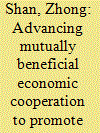

|
|
|
| 2 |
ID:
167737
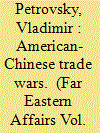

|
|
|
|
|
| Summary/Abstract |
The dispute between the United States and the People's Republic of China over trade and economic issues has a long history. It has now become clear, however, that Donald Trump's protectionist policy is in direct contrast to China's consistent position in defense of free trade, based on the principles of the World Trade Organization (WTO). Washington sees in Beijing its main strategic competitor and has adopted a policy of long-term opposition to China in all spheres, including trade and economics. Having launched a trade war against China, the United States is also doing its best to weaken by noneconomic means their growing competition in the field of high technology.
|
|
|
|
|
|
|
|
|
|
|
|
|
|
|
|
| 3 |
ID:
089603
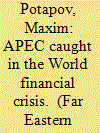

|
|
|
|
|
| Publication |
2009.
|
| Summary/Abstract |
The author reviews the results of the APEC meeting in Lima, Peru. The significance of the forum is examined in the context of the current world financial crisis and prospects for commercial and economic liberalization and integration in the region.
|
|
|
|
|
|
|
|
|
|
|
|
|
|
|
|
| 4 |
ID:
104101
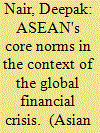

|
|
|
|
|
| Publication |
2011.
|
| Summary/Abstract |
Has the global financial and economic crisis provided stimulus for institutional development in ASEAN? Exploring the empirical trends concerning ASEAN's plans for a comprehensive community by 2015, it is a argued that no such developments have emerged. Instead, two alternative sources for potential change in ASEAN's institutional norms are elaborated
|
|
|
|
|
|
|
|
|
|
|
|
|
|
|
|
| 5 |
ID:
100267
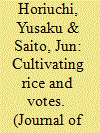

|
|
|
|
|
| Publication |
2010.
|
| Summary/Abstract |
We explore in this article an institutional foundation of agricultural protectionism in Japan, a country long recognized as resisting international pressures to open up its rice market. Using our qualitative analysis of postwar politics of agricultural protectionism and a simple formal model, we argue that farmers in Japan have stronger incentives to mobilize electoral support for the governing party in multimember district systems than in single-member district systems, because the marginal effects of mobilization on policy benefits are different under these electoral systems. Our empirical findings corroborate this claim and provide implications for the gradual changes in Japan's farm policies occurring after the electoral reform in 1994.
|
|
|
|
|
|
|
|
|
|
|
|
|
|
|
|
| 6 |
ID:
101909
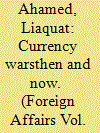

|
|
|
|
|
| Publication |
2011.
|
| Summary/Abstract |
The aftermath of the Great Depression saw a burst of competitive currency devaluations and protectionism that undermined confidence in an open global economy. As countries recover from the financial crisis today, they need to heed the lessons of the past and avoid the beggar-thy-neighbor policies of the 1930s.
|
|
|
|
|
|
|
|
|
|
|
|
|
|
|
|
| 7 |
ID:
144008
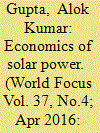

|
|
|
|
|
| Summary/Abstract |
The McKinsey paper which has been quoted above in the text rightly claims that while solar power can certainly help to satisfy the desire for more electricity and lower carbon emissions, it is just one piece of the puzzle. There are thus, many more challenges that even this newly emerging sector shall have to face and many of them may be common across the world. Several technologies are competing to win the lowest-cost laurels, and it’s not yet clear which is going to win.
|
|
|
|
|
|
|
|
|
|
|
|
|
|
|
|
| 8 |
ID:
192143
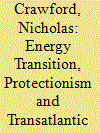

|
|
|
|
|
| Summary/Abstract |
US President Joe Biden has worked to repair the damage done to the transatlantic relationship by his predecessor, quickly realigning the United States with Europe on issues of energy and climate change. However, the US Inflation Reduction Act (IRA) of 2022 introduced a raft of protectionist subsidies for US clean-energy industries and reignited tensions between the US and the European Union. The EU has warned that the IRA could damage the bloc’s industry and American critics suggest the act may trigger a new US–EU trade war. The Biden administration’s geopolitical internationalism is at odds with its geo-economic nationalism. The fact remains, however, that Europe is unlikely to be severely affected by the IRA. Moreover, European political leaders have threatened more aggressive responses to the IRA than they can deliver. A trade war is unlikely. It is more likely that booming green industries in the EU and US will open new avenues to cooperation between them.
|
|
|
|
|
|
|
|
|
|
|
|
|
|
|
|
| 9 |
ID:
118084
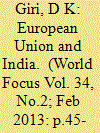

|
|
|
| 10 |
ID:
082349
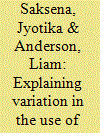

|
|
|
|
|
| Publication |
2008.
|
| Summary/Abstract |
Despite the much-touted celebration of the successes of the General Agreement on Tariffs and Trade/World Trade Organization in liberalizing free trade, these successes have been limited due to the increasing use of non-tariff barriers (NTBs) as a form of 'protectionism in disguise.' Among advanced industrial economies, the use of NTBs varies considerably. The purpose of this paper is to explain what accounts for this variation. We locate the issue of international trade in its appropriate theoretical context - as a two-level game in which politicians simultaneously face pressure at the international level to fulfill commitments to international free trade agreements, and domestic pressures for protectionist relief. We conduct a statistical analysis using a simple, multivariate regression model examining data at three points in time, 1988, 1993, and1996, to highlight the causes of the rise in NTBs and variation in their usage. We hypothesize that PR-based systems are associated with lower rather than higher levels of NTBs
|
|
|
|
|
|
|
|
|
|
|
|
|
|
|
|
| 11 |
ID:
152584
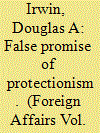

|
|
|
|
|
| Summary/Abstract |
In his inaugural address, U.S. President Donald Trump pledged that economic nationalism would be the hallmark of his trade policy. “We must protect our borders from the ravages of other countries making our products, stealing our companies, and destroying our jobs,” he said. Within days, he withdrew the United States from the Trans-Pacific Partnership (TPP), announced that he would renegotiate the North American Free Trade Agreement (NAFTA), and threatened to impose a special tax on U.S. companies that move their factories abroad.
|
|
|
|
|
|
|
|
|
|
|
|
|
|
|
|
| 12 |
ID:
113380
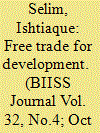

|
|
|
|
|
| Publication |
2011.
|
| Summary/Abstract |
Over the years, free trade has been an issue of great debate. The present paper tries to examine whether free trade is conducive for the development of the developing nations. Instead of focusing on the rhetoric attached to free trade, it makes an attempt to look into the flaws in comparative advantage theory, which is a theoretical foundation of free trade. A considerable part of the paper is devoted to analyse some concerning facts related to free trade. The paper concludes that protectionism along with some appropriate government policies should be the way forward for the developing economies before their industries are exposed to free trade regime.
|
|
|
|
|
|
|
|
|
|
|
|
|
|
|
|
| 13 |
ID:
124159
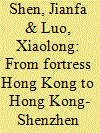

|
|
|
|
|
| Publication |
2013.
|
| Summary/Abstract |
The Hong Kong government was less active in regional integration before 2003. This study explores what conditions have contributed to the shifting of the Hong Kong government's stance on Hong Kong-Shenzhen integration from protectionism to cooperation since 2003. In addition to secondary data, a questionnaire survey and interviews were conducted in this study. Various external and internal economic, political and social factors that have contributed to the emergence of government-led strategy for regional integration in Hong Kong are analyzed. It is found that regional integration is facilitated by consensus building among the government, political parties, other interest groups and residents within Hong Kong.
|
|
|
|
|
|
|
|
|
|
|
|
|
|
|
|
| 14 |
ID:
156221
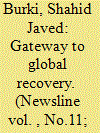

|
|
|
| 15 |
ID:
106005
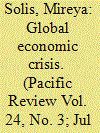

|
|
|
|
|
| Publication |
2011.
|
| Summary/Abstract |
Political economists have long noted that the prospects for trade liberalization diminish in a climate of economic recession. A stagnant economy intensifies the burden of adjustment for non-competitive sectors and polarizes domestic trade politics. Not surprisingly, the global financial crisis has raised concerns of a substantial protectionist backlash, through the imposition of national measures that circumvent WTO disciplines such as anti-dumping or tied stimulus packages. The impact of economic crisis on regional integration is, however, more ambiguous and has not been explored systematically. On the one hand, policymakers may be pressed to renege on trade liberalization commitments on all fronts - also weakening the momentum to negotiate or implement free trade agreements (FTAs). On the other hand, policymakers may be tempted to 'insulate' their region from adverse global trends and may see FTAs as more amenable to political manipulation that shelters inefficient sectors. In order to shed light on the connection between external crisis and regionalist drive, this article assesses three main challenges East Asian elites confront in devising a regional trade bloc capable of acting as a growth locomotive: institutional fit, multilateralization, and architectural design. The track record of East Asian governments of negotiating FTAs to score diplomatic points abroad and ensure political survival at home - at the expense of maximizing economic gains through far-reaching liberalization - does not bode well for the magnitude of this challenge.
|
|
|
|
|
|
|
|
|
|
|
|
|
|
|
|
| 16 |
ID:
186771
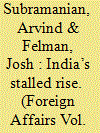

|
|
|
| 17 |
ID:
131588
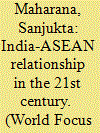

|
|
|
|
|
| Publication |
2014.
|
| Summary/Abstract |
A clear-cut observation on India-ASEAN relations make it clear that both the parties have been able to establish good relationship in political, economic and security sphere where their economic relation occupies a predominant position. After India's adoption of look east policy and reforms in Indian economy, the protectionist nature was removed and India-ASEAN trade placed for open competition and in these circumstances India-ASEAN trade is increasing to its maximum. So it is necessary that the leaders of India and ASEAN work to resist protectionism in the future, and this would help for deepening the bilateral ties between India and ASEAN countries.
|
|
|
|
|
|
|
|
|
|
|
|
|
|
|
|
| 18 |
ID:
091240
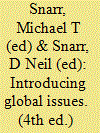

|
|
|
|
|
| Edition |
4th ed.
|
| Publication |
New Delhi, Viva Books, 2010.
|
| Description |
xii, 361p.:fig, tableHbk
|
| Standard Number |
9788130912226
|
|
|
|
|
|
|
|
|
|
|
|
Copies: C:1/I:0,R:0,Q:0
Circulation
| Accession# | Call# | Current Location | Status | Policy | Location |
| 054373 | 909.831/SNA 054373 | Main | On Shelf | General | |
|
|
|
|
| 19 |
ID:
071455
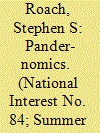

|
|
|
| 20 |
ID:
081298
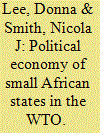

|
|
|
|
|
| Publication |
2008.
|
| Summary/Abstract |
Small states have come to play an increasingly active part in multilateral trade negotiations in the World Trade Organization (WTO) such that small state activism has been a major contributory factor in the continuing delay in concluding the Doha Development Agenda (DDA) negotiations. This suggests that small states are no longer bit players and are instead key actors in the WTO. Through the formation of a range of alliances, small developing states have become central to the process and form of multilateral trade negotiations. In this article we highlight this increasing activism of small states through a study of the DDA cotton negotiations. We focus in particular on the activism and influence of four small developing African states; Burkina Faso, Benin, Chad and Mali in the negotiations. In order to explore whether size really 'matters' in the WTO system, our study demonstrates that while size has some relevance-since it creates unequal deliberative capacities-the major obstacle to effective influence is the persistence of protectionist policies in the cotton sector and the inability of the WTO to enforce its own liberal trade rules and obligations
|
|
|
|
|
|
|
|
|
|
|
|
|
|
|
|